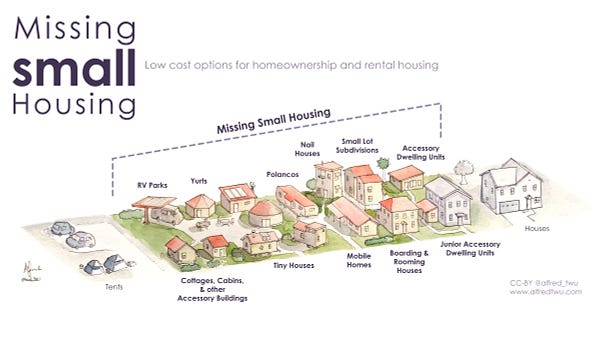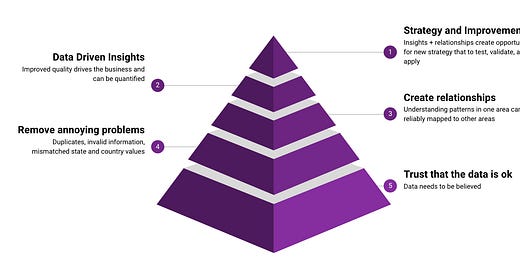This week’s toy: a word generator of imaginary words. Imaginary words - like this one - sound familiar and just might become words in the future. Edition No. 37 of this newsletter is here - it’s March 14, 2021.
The Big Idea
Data (particularly good data) is fundamental to the success of an organization. I’ve been working on a model to explain this to people who don’t delve into data quality on a regular basis, and it’s starting to appear like Abraham Maslow’s hierarchy of needs. So let’s call this an adapted “Maslow’s Hierarchy of Data Quality” to describe the ways in which data affects your organization.
The Hierarchy of Data Quality Needs
In the original work that produced the Hierarchy of Needs, Maslow summarized that we need a few things to unlock our higher abilities. By covering basic needs (food, shelter, safety, security) we remove our “fight or flight” responses. By covering psychological needs (friendship, love, feelings of accomplishment and belonging) we make it possible to go beyond ourselves and join communities. And by being creative and reaching our full potential, we open up the possibility of “self-actualization” and being the best people we can be.
What would this look like for Data Quality? I think it includes the following ideas.
Data quality needs to be:
TRUSTED - without trust in your data, no one in your organization believes it to be related to the truth, much less the sole source of truth
PLEASING - when your data quality is annoying and the source of many questions, you’re in trouble. When no one says “the data is horrible” things are starting to look better.
RELATED - understand the grammar of data in your system enables you to infer other observations about that same system. Related data implies shared conversation, definitions, and types.
INSIGHTFUL - improved quality opens your eyes to see improvements in the business driven by an understanding of the data in the system
STRATEGIC - with insights and relationships, you are able to see the possible future of the business and to build hypotheses to test that future
Going beyond reports
In many organizations, getting to step 1 in the model above might take a long time. If there is a history of data mistrust, building trust in your team and your data seems like a giant task. But looking at the model like a series of scaffolding steps, you see what it will take to get there.
Trust involves “one in a row” repeated. When users encounter data from your system and it behaves like they respect, you win. When they see unexpected information, trust is eroded.
Establishing trust leads you to the possibility of creating delight in the data. When new data is better than expected and uncovers unexpected information, the data has provided more than just information. It’s on the way to creating the framework for decisions and insight.
What’s the takeaway? Take the long view with data quality. When you build a structure that leads to insight, discovery, and strategy, your organization will thank you for leveling up the decisions they make.
A Thread from This Week
Twitter is an amazing source of long-form writing, and it’s easy to miss the threads people are talking about.
This week’s thread: addressing the housing shortage in the US with smaller houses


Links for Reading and Sharing
These are links that caught my eye.
1/ Think Smarter - You don’t get more thoughts in a day, and your thinking rate is fixed. But you can remove some of the mental barriers you have by resolving the other things on your mind that are preventing you from making bad decisions. Some of the more obvious ones are stress, nutrition, and sleep.
2/ What’s in an email? - Having a short domain name is cool. What might even be cooler? Having an emoji email. Well, it’s actually not that cool but interesting to read about how one coder built emoji email addresses.
3/ Ancient Memes - As a meme-appreciating person, I think this code that creates images that look like medieval tapestries is quite amazing. I haven’t gotten to the point where I’ve created anything worthy of a medieval NFT, but …
On the Reading/Watching List
The 1978 version of All Creatures Great and Small is a wholesome way to spend an evening. There’s lots of British TV hijinx and many animals involved. The dog watching is also excellent. (You might watch this after exhausting the excellent new 2020 version).
You too can read the Sunshine Protection Act, which is a fancy way of saying that Congress is once again debating whether to end the clock changing nonsense we do every year. (I’d be happy to never have to change a clock again.)
What to do next
Hit reply if you’ve got links to share, data stories, or want to say hello.
I’m grateful you read this far. Thank you. If you found this useful, consider sharing with a friend.
Want more essays? Read on Data Operations or other writings at gregmeyer.com.
The next big thing always starts out being dismissed as a “toy.” - Chris Dixon





